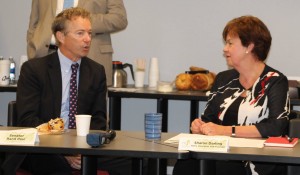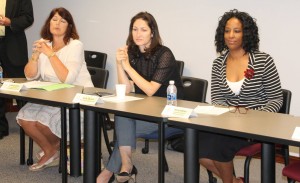Sen. Rand Paul joins conversation about two-generation learning
Two-generation family literacy programming lifts parents and children to find greater success academically and economically. That’s the message that Sen. Rand Paul heard from the National Center for Families Learning (NCFL) President and Founder, Sharon Darling, and our program participants and partners at a roundtable discussion at NCFL headquarters on September 25, 2017.
“The NCFL approach is a solution to transforming the way our government engages with low-income families in a way that provides families a genuine opportunity to gain essential workforce skills in a real-world context while addressing community problems at the same time,” Darling said. “It’s a win-win for tax payers, families, and communities. We see immediate and long-term effects happening sooner so that families cease to receive government assistance.”
NCFL works to eradicate poverty through education solutions for families. We work with more than 140 community partners across the U.S. using our Family Learning model, which is research-based and consists of adult skill building, child skill building, Parent and Child Together (PACT) Time®, and Parent Time.
In NCFL model programs, parents learn how to better work and learn together with their children, while also building employability, technology, and language skills. Data shows half of adults participating in 2017 got a better job and 53 percent upgraded their skills to earn more money after gaining experience with 40 out of 42 career and technical education skills.
“I’m a big believer that strong families play an integral role in the future success of individuals,” said Sen. Paul. “As I learned here today, NCFL is serving our communities through empowering entire families by giving parents the tools to support their children and gain necessary skills for employability. I’m grateful for the opportunity to learn more about this organization and look forward to hearing more of their success stories.”
Having served families for nearly 30 years, success stories are abundant. At the roundtable, Sen. Paul heard from parents who have personally experienced positive change in their lives, including:
Ronald Triplett, a parent participant in NCFL Family Learning in Louisville, Kentucky, says the program helped him strengthen his relationships with his four teenagers. “It allowed me to strengthen their social and academic bases,” Triplett said. Additionally, he says he now understands how to access school resources and better dialogue with his children’s teachers and principals.
Kenya Epps, a former parent participant and current director of Toyota Family Learning in Huntsville, Alabama, learned to be a better parent and how to deepen quality time with her children. She also gained employability skills and was hired as director of the NCFL model program she completed.
“The networks created through this program between families are incredible. We become one big family; supporting each other through challenges, giving each other rides to jobs and job interviews, and even babysitting their kids so they can work or go to school to improve their lives,” Epps said.
In Flint, Michigan, the community has identified two-generation family literacy as a way to mitigate the effects of lead exposure through tainted drinking water.
“The NCFL model helps parents and children build skills in meaningful ways,” said Lauren Chom, director of early childhood for Genesee (Michigan) Intermediate School District. “Parents gain workforce skills. We are even specifically training them to become classroom aids and are adding bus-driver training this year.”
Funding for education and family literacy initiatives is under constant threat of being eliminated. It is very important for educators, program staff, practitioners, and families to continue to share with your legislators the difference family literacy is making in your community. Find contact information for your legislators by visiting USA.gov.

